Striking a chord: How a small shop in London has been instrumental to the South Asian music scene in the West
Over the past four decades, JAS Musicals has seen changing demands for South Asian instruments: from local temple groups needing a couple of harmoniums for accompanying devotional recitals to Western rockstars wanting to put those same instruments on some of the world’s grandest and most iconic stages.
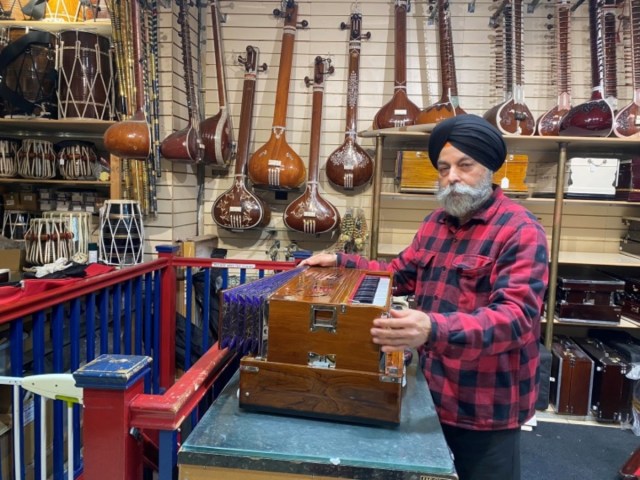 Harjit Singh (62) founded JAS musicals in 1985
Harjit Singh (62) founded JAS musicals in 1985 South Asian instruments began to weave their way into popular Western music over half a century ago with bands like The Beatles, The Kinks and The Rolling Stones experimenting with the sitar and the tabla and collaborating with Indian musicians like Ravi Shankar and his protégée Harihar Rao. Over the decades, with rapid growth in the British Indian population and Bollywood and Bhangra hits becoming popular internationally, South Asian instruments have become a familiar sound for UK audiences.
Few have perhaps been more aware of this meteoric rise in the popularity of Indian instruments in the UK than JAS Musicals, a small shop in West London’s Southall that has been supplying, manufacturing, modifying and repairing South Asian instruments since the 1980s. Over the past four decades, JAS Musicals has seen changing demands for South Asian instruments: from local temple groups needing a couple of harmoniums for accompanying devotional recitals to Western rockstars wanting to put those same instruments on some of the world’s grandest and most iconic stages.
Sitting modestly on Southall Broadway, the one-stop shop’s simple signage masks a trove of instruments from all across the Indian subcontinent, not to mention the books, dancing bells and other accessories that line the walls inside. To describe the shop as an Aladdin’s cave would be both accurate and fitting considering all of the playable props – from horns to English walking drums – in Disney’s 2019 live-action adaptation of the tale were provided by JAS.
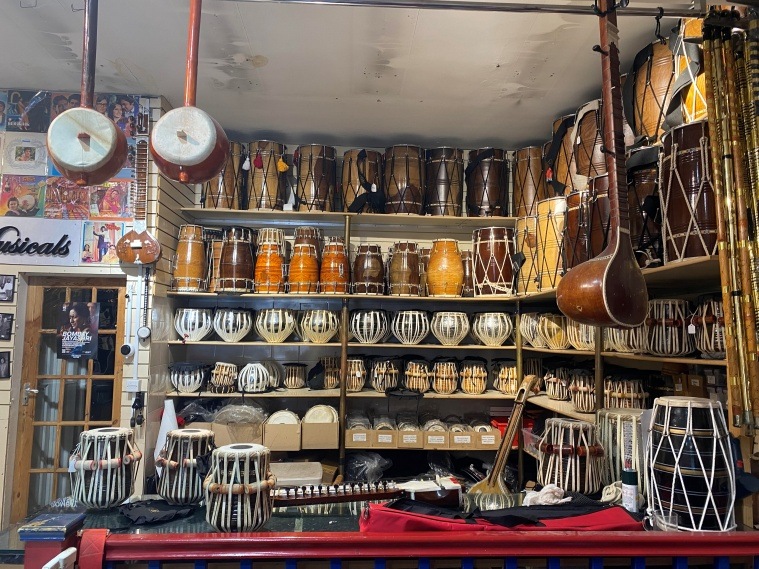 Tablas, dhols, mridangams, sitars and countless other instruments fill the small shop on Southall Broadway.
Tablas, dhols, mridangams, sitars and countless other instruments fill the small shop on Southall Broadway.
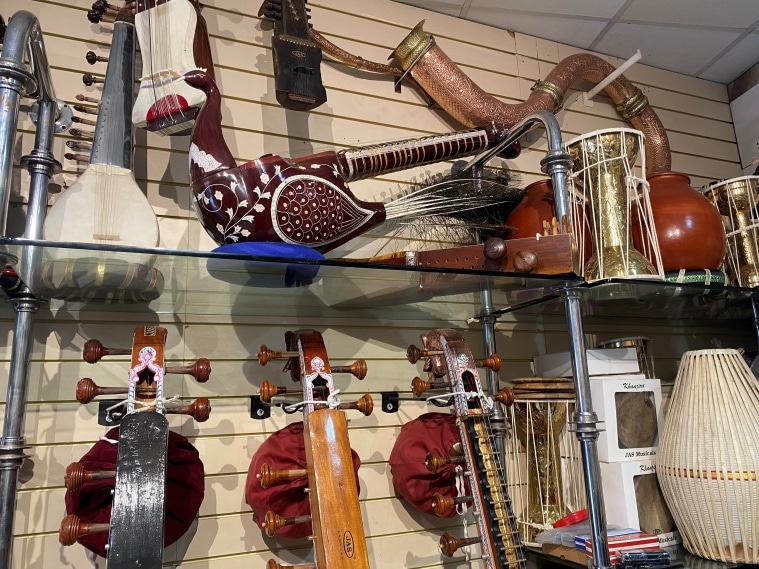 Above rows of Saraswati veenas, khols and kanjiras, certain instruments (top right) were used as props in Disney’s Aladdin (2019).
Above rows of Saraswati veenas, khols and kanjiras, certain instruments (top right) were used as props in Disney’s Aladdin (2019).
On a Sunday morning, Harjit Shah, now 62, who founded JAS Musicals in 1985, sits below shelves of tablas as harmonium reeds are tested by specialists in the shop, including his son, Sadhu, who now works alongside him. Surprisingly, Shah does not hail from a family of professional musicians. His father, who owned textile mills in India, was a skilled tabla player though he did not venture beyond accompanying kirtan recitals in temples. It was instead by pure accident, and as Shah believes, divine intervention that the specialist ventured into the music business.
“Nothing was planned. It’s a weird story. In 1984 when I came to this country, I was visiting on a business trip, having joined the family business. At that point, I had no knowledge of musical instruments at all. Whilst I was here, Indira Gandhi was assassinated and, as the circumstances in India were not good for Sikhs, I was stuck in this country and given a one-year visa,” he recollects.
It was a chance meeting that would help him identify the gap in the market and seal his fate. “One of my father’s friends requested me to ask my brothers in India to send a few harmoniums for a local temple as we had an import and export license. He suggested it as a business idea but it didn’t click in my mind immediately, though demand started to trickle in and my business took off,” he narrates.
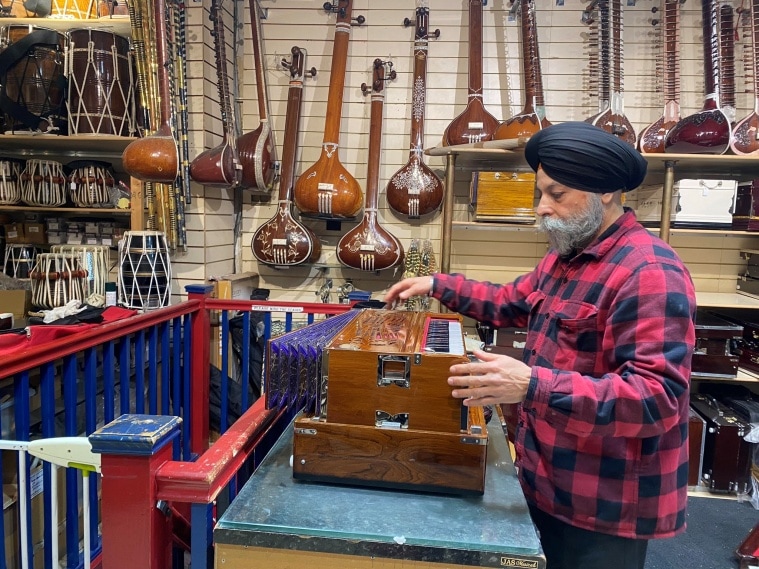 JAS founder Harjit Shah opens up one of JAS’s famous harmoniums.
JAS founder Harjit Shah opens up one of JAS’s famous harmoniums.
For the first five years, Shah was just importing and supplying instruments but an ingrained entrepreneurial streak urged him to identify what was lacking in the South Asian instrument market amidst a rise in South Asian diaspora communities in the West. “I noticed a lack of technical knowledge amongst other Western traders. The way I viewed the instruments I was selling started to change. I began to open up the instruments in my home garage and look inside at how they were built, how they produced the sounds that they did,” he recalls.
In the late 1980s, Shah bought a shop upstairs in Southall Broadway and people started bringing instruments to him for repair. “This was a good opportunity for me to start learning instruments and music. I was saying yes to every problem and looking at it as a learning opportunity,” says Shah. The shop quickly grew to become the place to have South Asian instruments repaired in the UK, with Shah becoming the expert on the ins and outs of strings, heads and bodies.
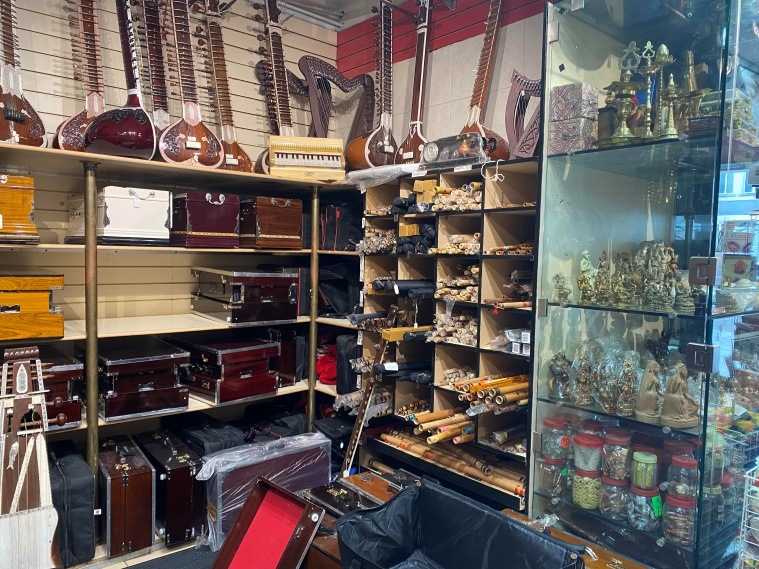 With Shah’s experience, built over years of studying practically any South Asian instrument he would encounter, the space has grown to become a one-stop shop for everything from harmoniums to flutes.
With Shah’s experience, built over years of studying practically any South Asian instrument he would encounter, the space has grown to become a one-stop shop for everything from harmoniums to flutes.
Deciding to bring his instruments closer to the British public, Shah looked for exhibition opportunities, supplying instruments to local schools in the early 90s and introducing his instruments at festivals like Glastonbury and Sidmouth. “People loved touching the sitar because of The Beatles and Ravi Shankar, feeling it, wanting to learn how to hold it and play it.”
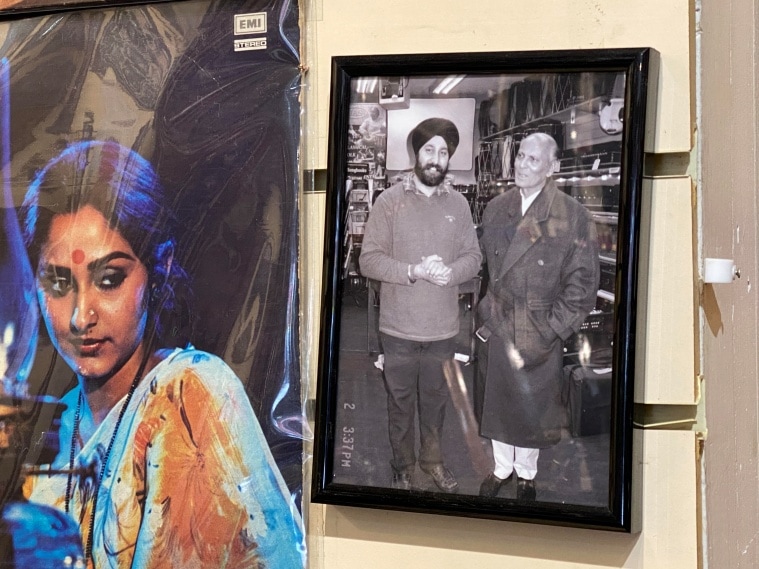 The shop has hosted a huge number of Hindustani and Carnatic classical music stalwarts, seen in black and white photographs on the walls.
The shop has hosted a huge number of Hindustani and Carnatic classical music stalwarts, seen in black and white photographs on the walls.
It was at an exhibition in Hammersmith in 1997 that Shah would meet Terence Pamplin, a renowned lecturer in Musical Instrument Technology, who urged him to involve himself in researching South Asian instruments academically. The experience proved life-changing, giving Shah a new sense of purpose as he brought South Asian instruments into the new millennium.
Shah is especially well-known in UK Bhangra circuits, for instance, for being the sole supplier of a UK Bhangra-dhol that stands up to the rainy UK climate, unlike its traditional counterpart.
Whilst Shah believes the dhol is slowly gaining respect and being considered on par with other instruments nowadays, hereditary dhol players were traditionally from lower castes, with dhol playing seen as a means of making a living over an art form. The instrument was not developed.
“When I started selling dhols in the late 80s and 90s, the Bhangra groups here in the UK, like Alaap and Heera, and Punjabi musicians like Johnny Kalsi, were struggling with instruments and telling me that the dhol was a big problem,” he recalls. The cold and wet UK weather caused a problem as the dhol is made of natural skins – the treble did not sound like a treble and the base was too loose all of the time. “After much research and development, we eventually introduced the Western snare drum head to the design, before shaping the profile of the body, which we believe has resulted in the very best Bhangra dhol,” says Shah.
JAS’s UK Bhangra dhol remains immensely popular amongst Bhangra bands in the UK and beyond. According to Rohan Bagai from Dynasty Drummers, a UK-based dhol squad that has been using JAS dhols collectively for 10 years, “JAS has established itself as a first stop for UK-based Bhangra musicians and is a household name. They have increased the number of people that take up learning a desi instrument, helping you out with getting started, even recommending teachers for whatever instrument. This means desi music and theory can live longer.”
In Canada, where roughly 2.6 per cent of the population are Punjabi, JAS dhols as well as harmoniums have a solid fan following, according to Shubkarman Singh, a Punjabi singer based out of Toronto. “People here love JAS dhols and their English-reed harmoniums. I remember, in the late 90s, my uncle bought a dhol and the wood quality was unbeatable. I recently visited and made it a point to buy a scale changer harmonium with special English reeds which are only made by JAS,” he says.
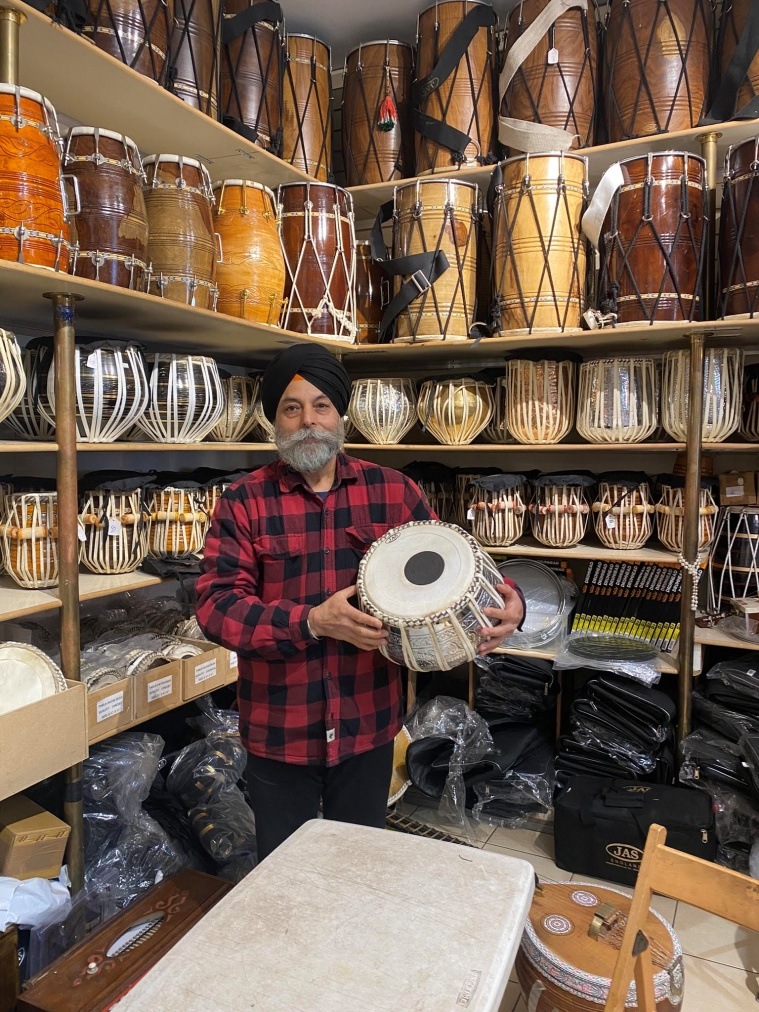 Shah poses with a tabla in front of shelves of JAS dhols, tablas and different drumheads.
Shah poses with a tabla in front of shelves of JAS dhols, tablas and different drumheads.
A large fraction of the JAS Musicals’ shelf space is taken up by rows of such harmoniums, another instrument to which Shah has paid significant attention over the years, developing special reeds. “People would bring their harmoniums to the UK from India and find that the change in weather caused their harmoniums to stop working. My research took me around Europe and, using the accordion reeds as a reference, in 2001, I designed and introduced a very successful harmonium reed with a brass body and steel tongue,” Shah says.
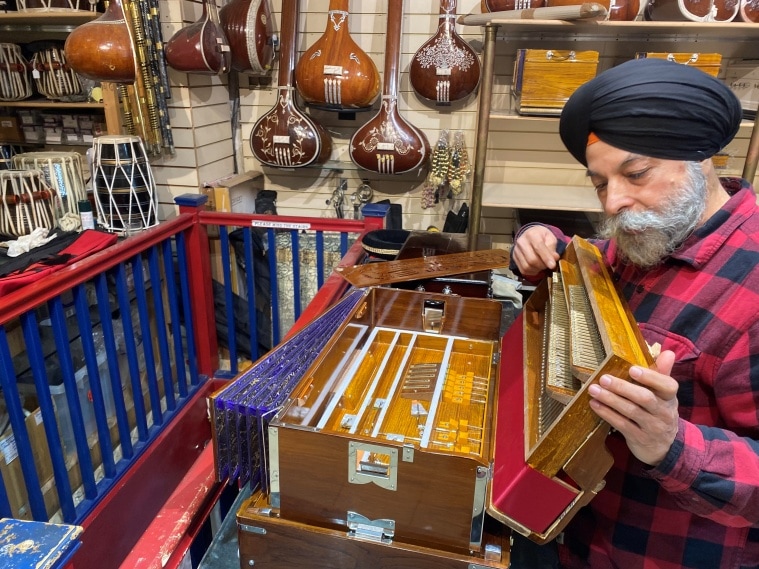 Shah displays his modified harmonium reeds which took him several years of research and experimentation to develop.
Shah displays his modified harmonium reeds which took him several years of research and experimentation to develop.
From staying in villages in Kolkata in West Bengal and researching the tools, techniques and lives of hereditary sitar makers to learning the veena down south in Thanjavur in Tamil Nadu and exploring how various drums are manufactured up north in Lucknow, Benares and Rajasthan, Shah has remained committed to understanding traditional techniques and is careful not to undermine hereditary instrument makers.
“Sadly, makers back home are worried, thinking that I’ll enter the Indian market and that they’ll lose their livelihoods. My intention, however, is to help make makers more efficient so that they are able to make higher quality instruments in larger numbers over a shorter period of time at the same cost,” he says. Shah believes that many makers have not been able to receive technical education and are firmly attached to old, traditional styles of instrument making. This gap in understanding is very difficult to fill, he feels.
Shah does, however, feel optimistic about the circumstances for hereditary makers. “Due to social media and the internet, demand for Indian instruments is high and makers are making and selling instruments from home on social media, which is easy for them to operate. Now the market which we have opened here in the West outside India is benefitting my people back home. That satisfies my soul.”
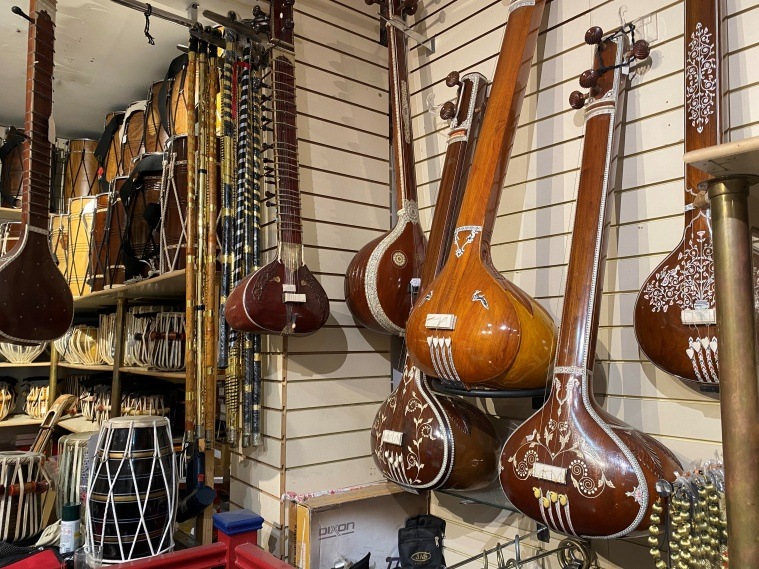 Ornate sitars hang from JAS Musical’s walls and ceilings. Stringed instruments are Shah’s latest focus.
Ornate sitars hang from JAS Musical’s walls and ceilings. Stringed instruments are Shah’s latest focus.
Reminiscing about some of his memorable clients over the years, Shah draws on a host of both South Asian and Western musical royalty. Jimmy Page, guitarist and founder of the rock band Led Zeppelin, for instance, came to have his sitar fixed in the 90s. For years, David Grey has used JAS Musicals harmoniums on stage and the shop still maintains the instruments of the English rock band Blur. Famous Indian musicians like tabla player Ustad Zakir Hussain and British-Asian musicians like Talvin Singh also count amongst the shop’s fans.
Liverpool-based Rich Bond, who is one half of the musical duo Loris and the Lion, believes that JAS Musicals has made the harmonium more accessible in the West. “We’ve been using our JAS Harmonium since we got it in 2016. It was our first – there weren’t that many reputable dealers/repairers around and JAS seemed to produce nice sounding instruments and had a few options to try out,” he says, adding, “Harmoniums in western music are more niche but when you do see them, they are often JAS.”
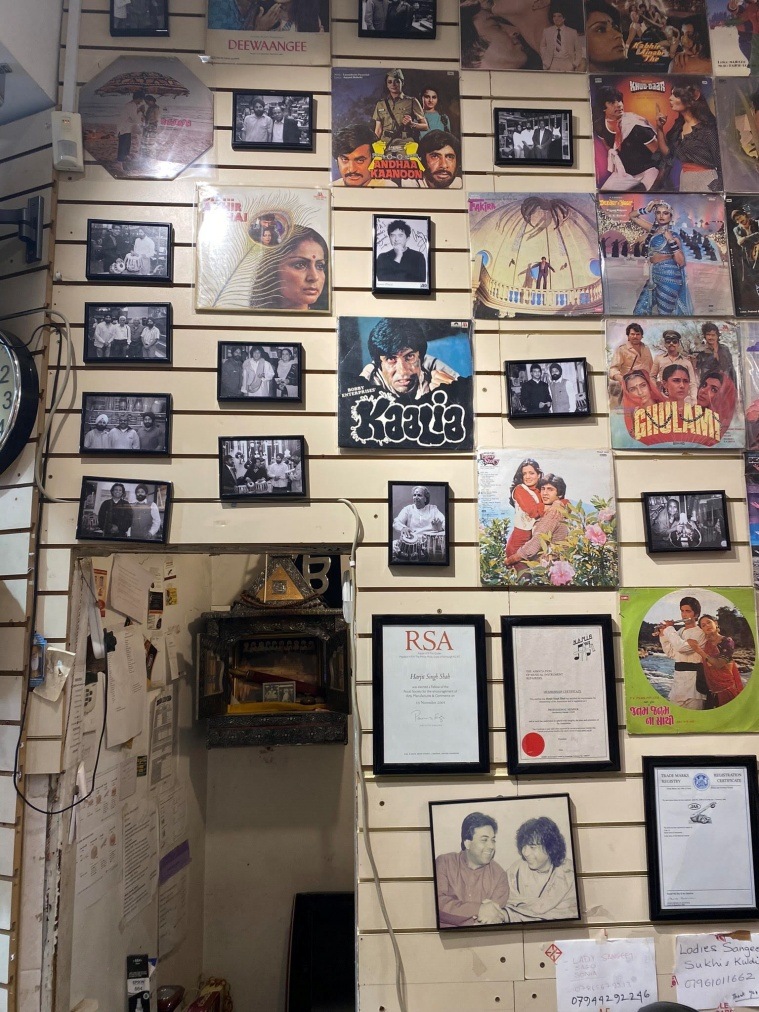 Interspersed with Hindi film soundtrack record sleeves are black and white photographs of Hindustani and Carnatic music stalwarts either visiting the shop or playing JAS instruments.
Interspersed with Hindi film soundtrack record sleeves are black and white photographs of Hindustani and Carnatic music stalwarts either visiting the shop or playing JAS instruments.
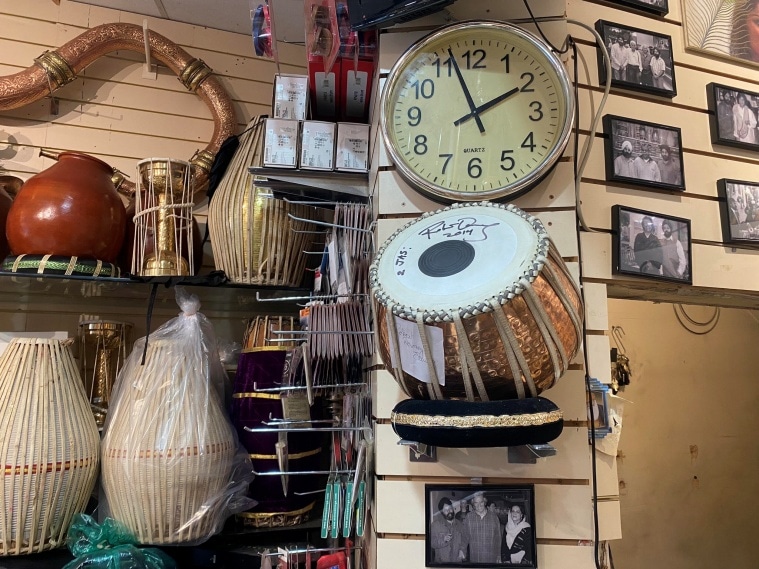 A tabla signed by Robert Downey Junior who visited the shop to purchase a tabla for his son. Below the table is a picture of Harjit Shah and his wife Jasmeet with John McLaughlin.
A tabla signed by Robert Downey Junior who visited the shop to purchase a tabla for his son. Below the table is a picture of Harjit Shah and his wife Jasmeet with John McLaughlin.
In addition to its famous clientele, JAS Musicals has also made a mark in Hollywood with its instruments being heard in scores of feature films like Disney’s The Jungle Book in 2016 and The Matrix film series.
Shah, however, maintains that every client who walks through the doors of his shop is equally important. “My mission is not to craft the world’s best instrument. My efforts are to ensure that every player, regardless of experience and financial situation, has access to a good instrument. I’m very fortunate and it is just a bonus that big musicians love my instruments and their quality,” he says.
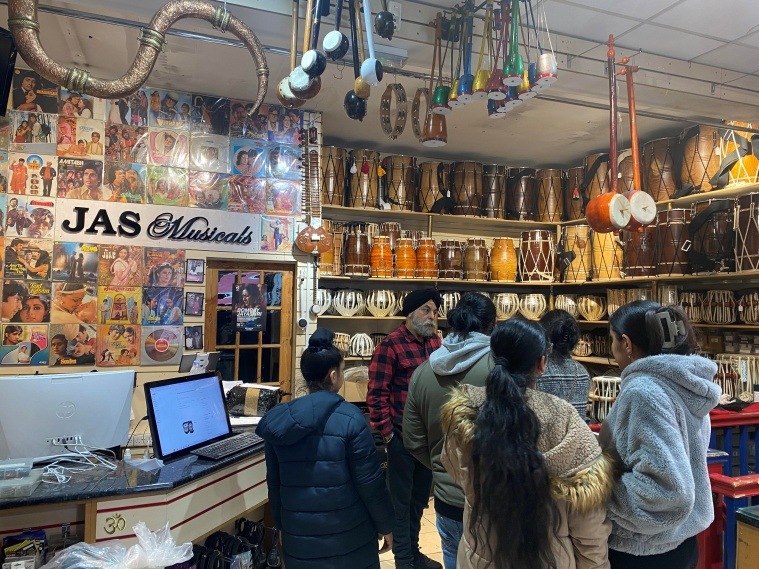 A crowd of customers with enquiries about purchasing instruments descend on the shop just after opening.
A crowd of customers with enquiries about purchasing instruments descend on the shop just after opening.
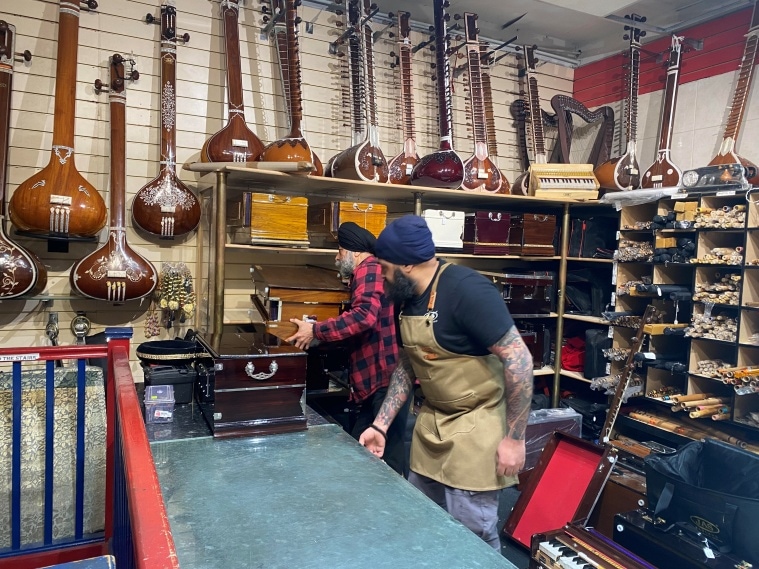 Harjit Shah and his son, Sadhu, get to work on JAS harmoniums.
Harjit Shah and his son, Sadhu, get to work on JAS harmoniums.
For Shah, there is still a lot of learning to be done, many projects to undertake and a whole world to be inspired by. “The people who come: my customers, musicians, teachers, professors are giving us lessons every day. Their requirements are our lessons. If they require something, we start working on it and that is what brings new ideas. Every customer is an ocean of new ideas,” he says.



- 01
- 02
- 03
- 04
- 05
























